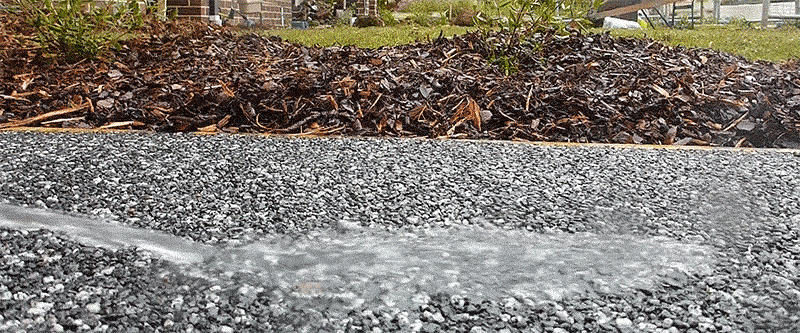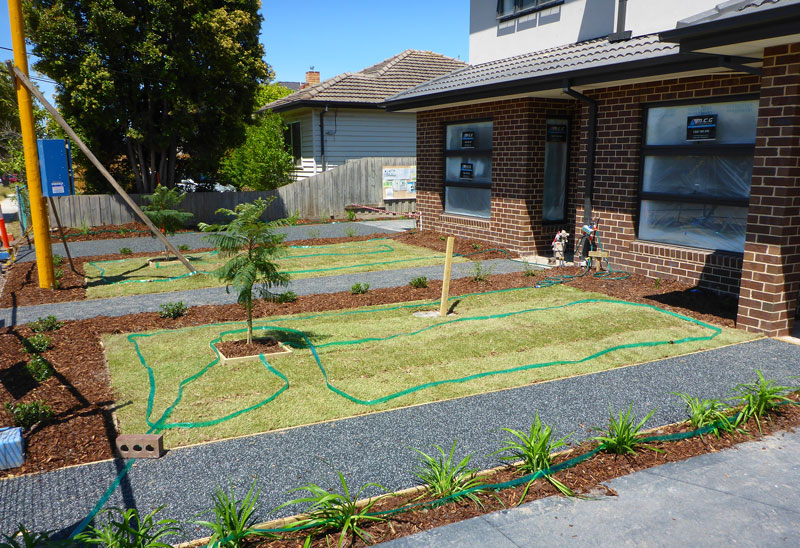What are Porous Pavers?
Porous pavers or porous pavements are two types of permeable surfaces often specified in new domestic and commercial developments. They can be made from different materials, sizes and shapes. Porous pavers offer a more environmentally-friendly paving solution compared to other types of paving due to its absorption system that provides many benefits.
How do Porous Pavers work?
Porous pavers are small concrete pavers with gaps between the edges, which are laid on a sand base. The joints between each paver is filled with a smaller aggregate. Through this purpose-built design, it allows for water to drain through the joints and permeate through the layers below into the sub base.
As water seeps through pavement, it acts as a natural filter for pollutants and then reaches the soil underneath. In contrast, non-permeable traditional pavers will cause rainwater to run off the surface towards the drain and through our stormwater management system.
As porous pavements are more widely installed, there is increasing demand for surfaces with a much higher porosity than these systems offer and that are sufficiently strong and durable to cope with industrial traffic.
Benefits of Porous Pavements
Councils and local governments increasingly require porous pavements to be used both in domestic and commercial developments, as Water Sensitive Urban Design (WSUD) becomes more important for water management and the environment. Porous pavers and pavements are a key feature of this. They allow for the water to drain back into the ground, rather than into stormwater drains.

Reduced Stormwater Run-Off
Porous pavers allow for water drainage into the ground and consequently can reduce stormwater run-off. Traditional paving surfaces, including concrete or asphalt, can cause rainwater to accumulate and create excess run-off, which leads to overwhelming drainage systems. By gradually absorbing water, porous pavers can minimise the negative effects of run-off, such as soil leaching and erosion.
Less Pollutants
Excess rainwater often gathers pollutants like oil, chemicals and debris, before entering into local waterways and reaching to our rivers and creeks, potentially compromising overall water quality. Porous pavers act as a filter to trap and remove these contaminants as the water percolates through the pavement and into the soil. This prevents it from entering our waterways and keeping our water cleaner.
Lowered Flood Risks
During heavy rain downpour, drainage systems can become overwhelmed with excess stormwater run-off and potentially lead to localised flooding. Porous pavers can help reduce the pressure on municipal stormwater systems by allowing the stormwater to directly penetrate into the ground and therefore less needs to be processed. They can help contribute towards a more resilient design and infrastructure for stormwater management.
Installing Porous Pavers
Our permeable paving is able to be used in a variety of domestic and commercial applications. Permeable paving that is installed over a permeable concrete base offers unrivalled levels of porosity, strength and durability.
Domestic Applications
Although porous pavers may have a higher upfront cost, they can ultimately be more cost-effective than traditional pavement due to their durability and lower maintenance requirements. Porous pavers can be installed across numerous residential applications including driveways, pool decks, patios and outdoor walkways.
For example, this subdivision required porous driveways and porous pavers for paths and patios as part of the landscaping. We installed our permeable paving for all these areas, as well as completing the landscape works. Overall, the whole site looks great, and will also treat a lot of its own stormwater!
Commercial Applications
Porous pavers are also often more durable than traditional pavement and can withstand heavy traffic and extreme weather conditions. They can provide a robust solution for commercial developments that have more stringent requirements including car parks, ramps, pathways, and tree surrounds.
Consultation with civil engineers enables us to specify and install a sub-base and drainage suitable for industrial grade pavements. If your landscaping requires porous pavements, or if you just have any questions on the benefits of permeable paving, then get in touch or give us a call today!
